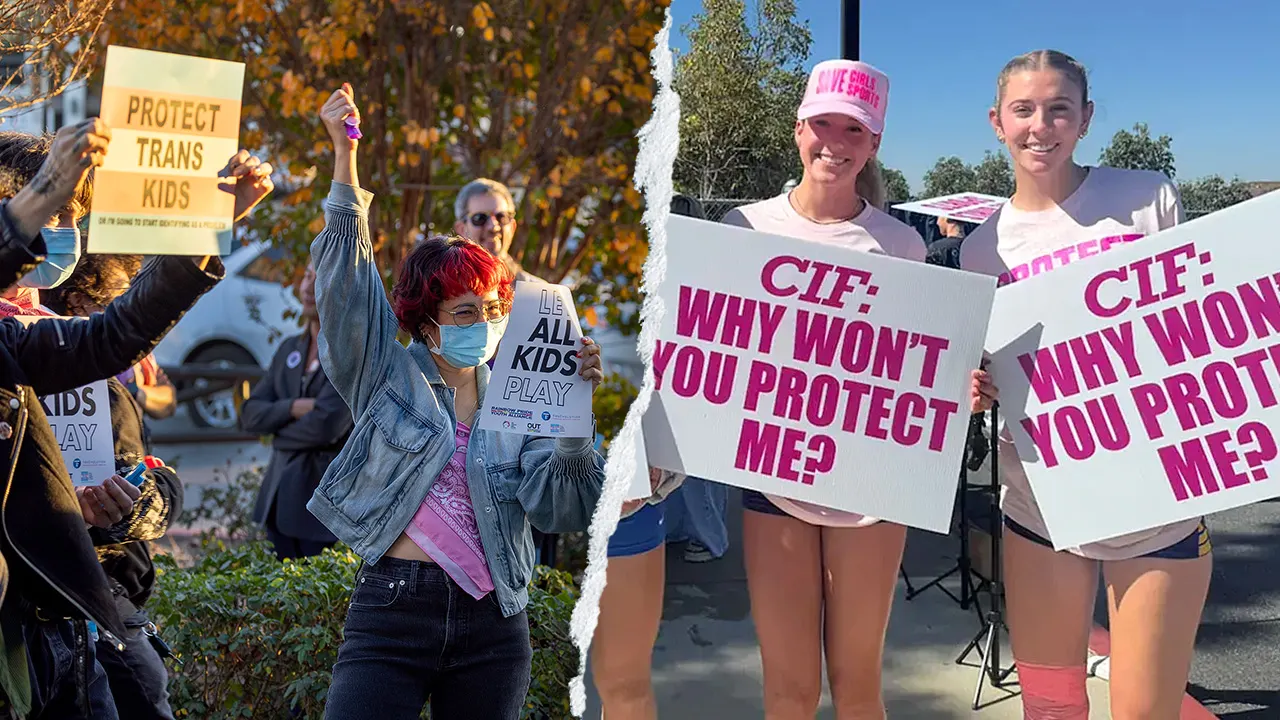
Tommy Pham speaks out against Gavin Newsom over controversial SAT score comments
Entities mentioned:
- Tommy Pham: Righteousness, Moral outrage, Pride
- Gavin Newsom: Recognition, Self-preservation, Influence
- Andre Dickens: Unity, Loyalty, Self-respect
- Izzy Gardon: Loyalty, Duty, Professional pride
Article Assessment:
Credibility Score: 70/100
Bias Rating: 65/100 (Lean Right)
Sentiment Score: 30/100
Authoritarianism Risk: 35/100 (Generally Democratic)
Bias Analysis:
The article leans right, giving more weight to criticism of Newsom and emphasizing conservative viewpoints. While it includes some defense of Newsom, the framing and source selection favor a right-leaning perspective.
Key metric: Racial Equality and Political Trust
Let me tell you something, folks - this political showdown is turning into a FULL-COURT PRESS! Tommy Pham, a free agent looking for his next big play, has come off the bench swinging against Governor Newsom's controversial SAT comments. It's like Pham saw an opening and DROVE TO THE HOOP, calling out what he sees as a FOUL PLAY in Newsom's game plan. The Governor, caught on his back foot, is trying to PIVOT and reframe his statement, but he's facing a FULL-COURT PRESS from critics who aren't buying his explanation. This is a CRUCIAL TURNOVER that could cost Newsom big in the political arena. It's CRUNCH TIME for his team to recover and regain control of the narrative before this becomes a GAME-CHANGING moment in his career.

Chad Bianco reveals his California sports vision: Saving the LA Olympics and trans athlete crisis consequences
Entities mentioned:
- Chad Bianco: Ambition, Righteousness, Justice
- Gavin Newsom: Power, Self-preservation, Ambition
- California Government: Control, Influence, Legacy
- Transgender Athletes: Recognition, Competitive spirit, Self-respect
- Female Athletes: Justice, Competitive spirit, Indignation
Article Assessment:
Credibility Score: 65/100
Bias Rating: 75/100 (Lean Right)
Sentiment Score: 30/100
Authoritarianism Risk: 55/100 (Mixed/Neutral)
Bias Analysis:
The article leans right, primarily presenting Bianco's perspective with limited counterarguments. It frames current leadership negatively while portraying Bianco's proposals favorably.
Key metric: California Youth Sports Participation Rate
Let me tell you something - this story is a GAME-CHANGER! We've got a real heavyweight bout brewing in the Golden State, folks! Chad Bianco is stepping up to the plate, swinging for the fences with his vision for California sports. He's calling out the current administration's playbook as a complete fumble when it comes to the Olympics and the trans athlete controversy. This isn't just a political scrimmage - it's a full-on championship fight for the soul of California sports! Bianco's game plan? He's looking to run a full-court press on homelessness before the Olympic torch arrives, and he's ready to throw a red flag on the whole trans athlete situation. But let me tell you, the opposition isn't going down without a fight. This is shaping up to be a real barn-burner, with the future of California's sporting landscape hanging in the balance. It's fourth and long for the current administration, and Bianco is bringing the blitz! Hold onto your seats, sports fans - this political athletic showdown is going into overtime!

UFC Champion Tito Ortiz flees home state California because of Newsom's leadership
Entities mentioned:
- Tito Ortiz: Pride, Security, Justice
- Gavin Newsom: Power, Control, Legacy
- Chad Bianco: Righteousness, Duty, Determination
Article Assessment:
Credibility Score: 65/100
Bias Rating: 75/100 (Lean Right)
Sentiment Score: 30/100
Authoritarianism Risk: 35/100 (Generally Democratic)
Bias Analysis:
The article leans right, giving more space to conservative viewpoints and criticisms of Newsom. It presents Ortiz and Bianco's perspectives prominently while offering minimal defense or context for Newsom's policies.
Key metric: California Population Growth
Let me tell you something, folks - this is a HEAVYWEIGHT BOUT for the future of California! In the blue corner, we've got Governor Newsom, the incumbent champ who's been taking some serious body blows lately. And in the red corner, the challenger Sheriff Bianco, backed by UFC legends looking to score a knockout! Tito Ortiz, a hometown hero, has thrown in the towel on California, making a fourth-quarter move to Florida. This is RIDICULOUS! We're seeing a mass exodus of talent from the Golden State, folks. It's like watching your star players get traded away season after season. Newsom's team is on the ropes, struggling to defend against accusations of rising crime and affordability issues. Meanwhile, Bianco is stepping up to the plate, showcasing a championship mentality by standing up to lockdowns. This political arena is heating up, and I'm telling you right now, the 2026 gubernatorial race is shaping up to be the Super Bowl of California politics!

New details emerge about California high school trans athlete saga suddenly being probed by the Trump admin
Entities mentioned:
- U.S. Department of Education: Justice, Control, Duty
- Jurupa Unified School District: Self-preservation, Obligation, Wariness
- Hadeel Hazameh: Righteousness, Determination, Self-respect
- Donald Trump: Competitive spirit, Justice, Influence
- Gavin Newsom: Power, Influence, Pride
Article Assessment:
Credibility Score: 75/100
Bias Rating: 65/100 (Lean Right)
Sentiment Score: 30/100
Authoritarianism Risk: 45/100 (Mixed/Neutral)
Bias Analysis:
The article leans right, focusing heavily on concerns about trans athletes in women's sports and highlighting conservative figures like Trump and Cruz. While it includes some opposing viewpoints, the framing favors those critical of trans inclusion policies.
Key metric: Title IX Compliance in School Athletics
Let me tell you something - this story is a FULL COURT PRESS on the issue of trans athletes in women's sports! We've got a HEAVYWEIGHT MATCHUP between state and federal governments, with California's Newsom trying to run interference while Trump's team blitzes with investigations. The real MVPs here are the young athletes like Hazameh, who've been forced to make TOUGH CALLS and leave it all on the field. This isn't just a game folks, it's a BATTLE for the very soul of women's sports! The clock is ticking, and we're seeing FOURTH QUARTER moves from both sides as they jockey for position in this high-stakes contest. It's going to come down to who can execute their game plan and make those clutch plays when it matters most!

California college athletics organization faces probe over transgender policy
Entities mentioned:
- California Community College Athletic Association (3C2A): Professional pride, Duty, Unity
- Department of Education: Justice, Control, Righteousness
- Justice Department's Title IX Special Investigations Team: Justice, Determination, Moral outrage
- Kimberly Richey: Righteousness, Moral outrage, Justice
- Gavin Newsom: Ambition, Influence, Power
- Trump Administration: Competitive spirit, Justice, Control
Article Assessment:
Credibility Score: 65/100
Bias Rating: 75/100 (Lean Right)
Sentiment Score: 30/100
Authoritarianism Risk: 45/100 (Mixed/Neutral)
Bias Analysis:
The article leans right, using loaded language like 'stunning indictment of our culture' and giving more space to conservative viewpoints. It frames the issue as ideological, emphasizing 'women's rights' over transgender inclusion.
Key metric: Gender Equality in Sports
Let me tell you something - this is a GAME-CHANGING play in the world of college athletics! The California Community College Athletic Association is facing a full-court press from the feds, and it's looking like a tough defensive battle ahead. We've got a real clash of titans here, folks, with the Department of Education and Justice Department tag-teaming to take on the 3C2A's transgender policy. This is the kind of high-stakes matchup that could rewrite the playbook for college sports across the nation! The Trump Administration is coming in hot, blitzing with a fierce defensive strategy to protect women's sports. Meanwhile, Governor Newsom's team seems to be running a different offensive scheme altogether. It's a classic showdown of competing game plans, and I'm telling you right now, this could go into overtime before we see a clear winner!

Golf legend Phil Mickelson weighs in on alleged fraud in California
Entities mentioned:
- Phil Mickelson: Righteousness, Indignation, Competitive spirit
- Donald Trump: Competitive spirit, Power, Influence
- Kevin Kiley: Righteousness, Duty, Competitive spirit
- Gavin Newsom: Self-preservation, Power, Competitive spirit
- Tim Walz: Self-preservation, Duty, Anxiety
Article Assessment:
Credibility Score: 55/100
Bias Rating: 65/100 (Lean Right)
Sentiment Score: 30/100
Authoritarianism Risk: 35/100 (Generally Democratic)
Bias Analysis:
The article leans right by giving more space to Republican viewpoints and fraud allegations. It presents Democrat responses but frames them defensively, suggesting a slight rightward tilt in narrative presentation.
Key metric: Government Efficiency and Fraud Prevention
Let me tell you something, folks - this political showdown is turning into a REAL BARNBURNER! We've got golf legend Phil Mickelson stepping up to the plate, swinging for the fences against alleged fraud in California. This is a WHOLE NEW BALLGAME, with Mickelson trading in his golf clubs for a megaphone! On the other side of the court, we've got Team Democrat led by Governor Newsom, playing defense against Trump's full-court press on fraud allegations. It's a high-stakes match where the scoreboard shows BILLIONS in taxpayer dollars on the line! Mickelson's bringing that championship mentality, calling for a timeout on new taxes until the government can clean up its act. Meanwhile, Trump's throwing Hail Mary passes, trying to connect fraud allegations across multiple states. This political arena is HEATING UP, and I'm telling you right now, we're heading into overtime with no clear winner yet! The real MVPs in this game? The taxpayers, sitting on the edge of their seats, waiting to see if their team can pull off the upset and tackle fraud head-on!

Ex-UFC fighter Dan Henderson endorses Chad Bianco for California governor, rips Newsom for state's issues
Entities mentioned:
- Dan Henderson: Righteousness, Justice, Duty
- Chad Bianco: Determination, Competitive spirit, Justice
- Gavin Newsom: Power, Control, Self-preservation
- ICE agents: Duty, Security, Professional pride
Article Assessment:
Credibility Score: 65/100
Bias Rating: 75/100 (Lean Right)
Sentiment Score: 35/100
Authoritarianism Risk: 40/100 (Generally Democratic)
Bias Analysis:
The article leans right, featuring a Republican candidate endorsed by a conservative figure. It focuses on criticisms of the current Democratic leadership without presenting balancing viewpoints.
Key metric: California Gubernatorial Race Polling
Let me tell you something, folks - this is a HEAVYWEIGHT BOUT for the future of California! Dan Henderson, the UFC legend, is stepping into the political octagon, throwing his support behind Sheriff Chad Bianco in this high-stakes gubernatorial showdown. Bianco's coming out swinging, leading the polls like a champ in the early rounds. But make no mistake, this is a marathon, not a sprint! Governor Newsom's team is on the ropes, folks, taking hits on everything from gas prices to wildfires. It's like they're playing defense in the fourth quarter, and the clock is ticking! The ICE agents? They're like the special teams getting blitzed from all sides. This is a full-court press on California's future, and every player needs to bring their A-game. Bianco's got that championship mentality, refusing to throw in the towel on COVID restrictions. Now that's the kind of GRIT Californians are looking for in their next leader!

California high schools at odds after alleged trans athlete displaces female on cross-country podium
Entities mentioned:
- Ayala High School: Justice, Competitive spirit, Professional pride
- Claremont High School: Loyalty, Obligation, Wariness
- California Interscholastic Federation (CIF): Control, Fairness, Obligation
- Caroline Cobo (Ayala coach): Justice, Determination, Professional pride
- Matthew Ullman (Ayala assistant coach): Justice, Determination, Professional pride
- Gavin Newsom: Fairness, Unity, Political influence
Article Assessment:
Credibility Score: 75/100
Bias Rating: 55/100 (Center)
Sentiment Score: 35/100
Authoritarianism Risk: 25/100 (Generally Democratic)
Bias Analysis:
The article presents multiple viewpoints, including statements from both schools and coaches. While it leans slightly towards Ayala's perspective, it provides context and official statements, maintaining a relatively balanced approach.
Key metric: Gender Equity in High School Sports
Let me tell you something - this story is a GAME-CHANGER! We've got a real battle brewing on the track, folks, and it's not just about who crosses the finish line first. Ayala High is coming out swinging, demanding a fair shake for their female athletes in a contest where the rulebook seems to be shifting under their feet. They're playing defense against a Claremont High team that's sticking to the playbook, but Ayala's coaches are showing true team spirit, going to bat for their runner who got edged out of the top 10. This isn't just about one race, it's about the whole league standings! The CIF tried to level the playing field with their spring rule change, but now we're seeing it's not a one-size-fits-all solution. This is fourth-quarter stuff, people, and Ayala's making a bold move to challenge the league's game plan. It's a high-stakes match where the definition of fair play is on the line, and believe me, every coach and athlete in California is watching to see how this plays out!

California high school volleyball team with trans athlete sees controversial season end with playoff loss
Entities mentioned:
- Jurupa Valley High School: Competitive spirit, Unity, Determination
- AB Hernandez: Competitive spirit, Self-respect, Recognition
- Valencia High School: Competitive spirit, Professional pride, Wariness
- California Interscholastic Federation (CIF): Control, Determination, Righteousness
- Donald Trump: Power, Control, Moral outrage
- Gavin Newsom: Power, Influence, Self-preservation
- U.S. Department of Justice: Justice, Control, Duty
- California state legislature: Power, Control, Influence
Article Assessment:
Credibility Score: 75/100
Bias Rating: 55/100 (Center)
Sentiment Score: 35/100
Authoritarianism Risk: 45/100 (Mixed/Neutral)
Bias Analysis:
The article presents multiple viewpoints and quotes from various sides of the issue. While it gives more space to those opposing trans athletes in girls' sports, it also includes counterarguments and context from supporters.
Key metric: Gender Equality in Sports
Let me tell you something - this story is a FULL COURT PRESS of controversy! We've got a real championship battle brewing between Team Inclusion and Team Tradition, folks. AB Hernandez has been the MVP of this debate, stepping up to the plate in both volleyball and track. But the opposition is bringing the heat, with lawmakers and activists playing zone defense to protect their vision of girls' sports. The CIF is running a no-huddle offense, changing rules on the fly, while the feds are throwing the challenge flag with a lawsuit. This is a high-stakes game, and I'm telling you right now, we're heading into overtime with no clear winner in sight. It's going to take a clutch performance from someone to break this deadlock and bring home the trophy of resolution!

California girls' volleyball team with trans player sees 10th match forfeited amid controversy
Entities mentioned:
- Jurupa Valley High School girls' volleyball team: Competitive spirit, Unity, Determination
- Alyssa McPherson: Justice, Self-respect, Moral outrage
- AB Hernandez: Competitive spirit, Recognition, Self-preservation
- California Interscholastic Federation (CIF): Obligation, Control, Professional pride
- Gavin Newsom: Ambition, Influence, Wariness
- Donald Trump: Power, Moral outrage, Influence
Article Assessment:
Credibility Score: 75/100
Bias Rating: 55/100 (Center)
Sentiment Score: 35/100
Authoritarianism Risk: 40/100 (Generally Democratic)
Bias Analysis:
The article presents multiple perspectives, including those of transgender athletes, protesting players, and political figures. While it leans slightly right by emphasizing controversy, it maintains a relatively balanced approach.
Key metric: Gender Equality in Sports
Let me tell you something, folks - this story is a GAME-CHANGER! We're seeing a full-court press of controversy in California high school volleyball, with teams forfeiting left and right like they're dodging a spike from the opposing side. The Jurupa Valley squad is facing a defensive wall of forfeits, but they're showing true championship mentality by staying in the game. This is a classic matchup of inclusivity versus traditional competition, and both sides are digging deep into their playbooks. The political power players are stepping onto the court too, with Governor Newsom trying to find the middle ground while Trump is calling for a full-court press against transgender athletes. It's a high-stakes match with no clear winner in sight, and the clock is ticking as we head into the postseason. I'm telling you right now, this is one for the record books!